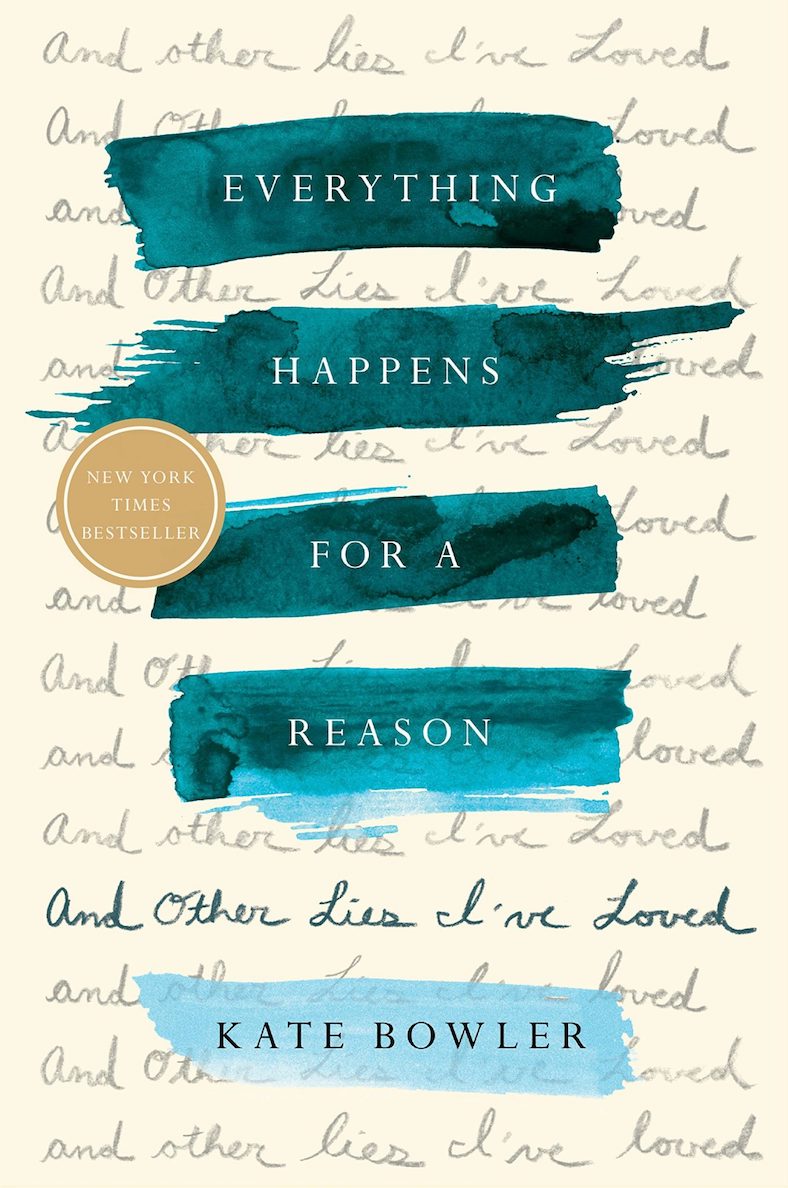In many ways Kate Bowler’s life is exceptional.
She’s happily married to her childhood sweetheart. Just a few years ago they became parents of a beautiful boy after years of trying. And her professional life got off to the kind of start most historians dream of. She earned a job teaching her specialty at Duke, her alma mater, and she published a celebrated first book [read TGC’s review of Blessed: A History of the American Prosperity Gospel].
Then, after months of intense stomach pain and a pile of negative test results, she was diagnosed with a rare form of cancer, stage 4, with little hope of life beyond the next few years. Her new book, Everything Happens for a Reason: And Other Lies I’ve Loved, tells how she has experienced the before and after of her diagnosis.
If you read Paul Kalanithi’s When Breath Becomes Air [read TGC’s review], this heartbreaking scenario may sound familiar. And if you appreciated that book I expect you will love Bowler’s too. It is that good. But you won’t have to read far to recognize that, for all its similarities to other books in its genre, this one is also wonderfully unique.
Bowler’s writing voice is irresistible. What she has to say is insightful, creative, even relentlessly funny. This is a beautiful book and, for precisely that reason, it’s all the more heartbreaking to consider what she’s facing.

Everything Happens for a Reason: And Other Lies I've Loved
Kate Bowler
The prospect of her own mortality forces Kate Bowler to realize that she has been tacitly subscribing to the prosperity gospel, living with the conviction that she can control the shape of her life with “a surge of determination.” Even as this type of Christianity celebrates the American can-do spirit, it implies that if you “can’t do” and succumb to illness or misfortune, you are a failure. Kate is sick, and no amount of positive thinking will shrink her tumors. What does it mean to die, she wonders, in a society that insists everything happens for a reason? Kate is stripped of this certainty only to discover that without it, life is hard but beautiful in a way it never has been before.
To read this book is to feel something of the offensiveness of death. This woman should not be mortal. How do we make sense of the fact that she is? How do we cope with the fact that we are too?
Everything Happens for a Reason is more than a memoir. It’s a theodicy. It raises crucial questions about why things happen the way they do. And it offers an almost playfully withering critique of answers that come too easily.
Read for Empathy
Before her diagnosis, Bowler had focused her academic career on explaining the prosperity gospel in American Christianity. Prosperity preachers promise health, wealth, and happiness as the God-given rewards for strong faith and good behavior. Simple cause and effect.
This prosperity gospel operates like a character in Bowler’s story, weaving in and out, not just as she reveals her backstory, but also as she wrestles with what’s happening to her now. With remarkable honesty, she describes how her diagnosis revealed prosperity assumptions in her own heart. And she allows us to follow along as she surrenders these certainties and accepts her new reality.
As a theodicy, Bowler’s book is more deconstructive than constructive. Bowler does more to undermine simplistic explanations for the problem of evil than to propose answers of her own. For that reason, this book isn’t meant as an overt guide for how to suffer in faith. If it were that sort of book, I don’t expect that her theological perspective is one I’d wholeheartedly commend. But I do wholeheartedly commend this book for what it does provide.
First, like all great memoirs or novels, Everything Happens for a Reason offers an opportunity to learn empathy.
Bowler guides us through the shock of diagnosis and the cycles of hope and despair during treatment. She helps us feel some of her exhaustion with the stream of insensitive comments and questions she’s faced from well-meaning people. She brings us into her growing awareness that, short of divine intervention, her range of outcomes will not include a cure. And she helps us imagine the gut-wrenching thought that her toddler could grow up without his mother, could grow up not remembering the moments that make up the precious days they’re spending together now.
Through honesty, self-awareness, and gifted writing, Bowler helps the rest of us learn how to better mourn with those who mourn. This learning experience alone is worth the time and emotional energy it takes to engage with this book.
Read for Foresight
But there is more to this book than the opportunity to deepen your empathy. It is a window into the thoughts, longings, and observations of an exceptionally articulate observer facing down one of the most unexceptional of human problems. I don’t mean terminal cancer, of course, or the prospect of leaving a toddler and a husband alone at such an early age. I mean the problem of death itself, which we have minimized and avoided far too often for far too long.
In stories like Bowler or Kalanithi’s we tend to focus on the circumstances that are so unusual and unexpected—the rareness of their diseases, the promise of their careers, the beauty of their family lives, and above all their youthfulness. These details act like a buffer between their mortality and ours. But when we read these stories in this way, they only reinforce our willful blindness to the inevitability of death, when they instead could help open our eyes.
We may never experience the sort of eye-catching losses Bowler reflects on so beautifully. But we will lose everything to death. At that level, the only buffer between her experience and ours is time.
We may never experience the sort of eye-catching losses Bowler reflects on so beautifully. But we will lose everything to death. At that level, the only buffer between her experience and ours is time. Time flies.
Read for Solidarity
Everything Happens for a Reason can also deepen our solidarity with the suffering and the dying in the meantime.
In one especially moving passage, Bowler writes of the isolation so familiar to those who face death surrounded by the young and the healthy:
It’s like we’re all floating on the ocean, holding on to our own inner tubes. We’re all floating around, but people don’t seem to know that we’re all sinking. Some are sinking faster than others, but we’re all sinking! . . . I am preparing for death and everyone else is on Instagram. (65)
She knows it’s not so simple and admits that’s not quite fair. But her frustration makes sense, and we desperately need to hear it.
If we’re living like immortals, the best we can offer sufferers like Bowler is pity. What we may feel, and keep to ourselves, is relief. Thank goodness it’s not me, not my wife, not my daughter.
But we owe our friends solidarity. Not a solidarity that minimizes their unique pain, as if there’s no difference between dying as a 30-something wife and mother and dying as a 95-year-old widower. I mean a solidarity rooted in the day-by-day awareness that death is a problem for us all. A solidarity that makes us unafraid to talk about hard things, and unsurprised when death shows its ugly face.
Our dying friends need to know we know we’re dying too. They need to see this solidarity in death so they can savor our solidarity in Christ.
Our dying friends need to know we know we’re dying too. They need to see this solidarity in death so they can savor our solidarity in Christ. Otherwise, when we talk of Jesus’s promises, it will come off as cliché. We’ll sound like we’re using these promises to escape from an awkward conversation. Or, worse, we’ll sound like we’re offering some sort of consolation prize for those who are losing at life, while we keep on working at the business of winning.
But when we cultivate death-awareness, as Bowler’s book helps us to do, our gospel ministry to one another takes on a different tone. The tone of desperate hope. We offer one another the same promises we cling to for ourselves, the one and only comfort in life and in death.
Related:
- A Dying Man Taught Me How to Live (Ivan Mesa)
- Death—Enemy or Friend? (Dane Ortlund)
- One Pastor’s Encounter with Death (Phil Letizia)
- The Anxiety Beneath All Your Anxieties (Phil Letizia)



































